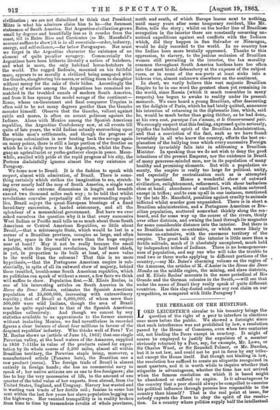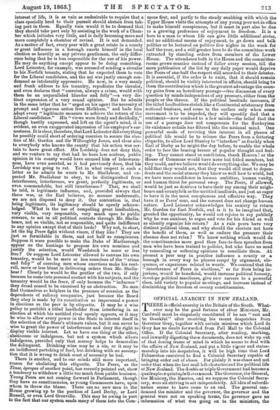THE PEERAGE ON THE HUSTINGS.
LORD LEICESTER'S circular to his tenantry brings the of the right of a peer to interfere in elections once more before the public. We showed a fortnight since that such interference was not prohibited by law, a resolution passed by the House of Commons, even when two centuries old, not binding the Peers except in courtesy. It might of course be employed to justify the expulsion of a member obviously returned by a Peer, say, for example, Mr. Lowe, or Sir Charles Wood, or Sir Rotindell Palmer, or Mr. Dundee,. but it is not law, and could not be put in force by any tribu- nal except the House itself. But though not binding in law, the resolution has sufficed to create an etiquette recognized in- most quarters, and it is worth while to inquire whether that etiquette is advantageous, whether the time has not arrived when the famous resolution on which it is based might. be abandoned or suffered to expire. Is it advantageous to- the country that a peer should always be compelled to exercise his political influence through persons less responsible to the country than himself? That is the real point at issue, for nobody expects the Peers to obey the spirit of the resolu- tion. In a country where politics supply half the intellectual interest of life, it is as vain as undesirable to require that a class specially bred to their pursuit should abstain from tak- ing part in them. Equally vain would it be to demand that they should take part only by assisting in the work of a Cham- ber which initiates very little, and is daily becoming more and more completely a chamber of revisal. It is not demanded. As a matter of fact, every peer with a great estate in a county or great influence in a borough exerts himself in the local election as heartily as any private gentleman, the only differ- ence being that he is less responsible for the use of his power. He may do anything except appear to be doing something. Lord Leicester, for example, was accused of sending a circular to his Norfolk tenants, stating that he expected them to vote for the Liberal candidates, and the act was justly enough con- demned as intolerably oppressive. He now, in a very manly and frank address to his tenantry, repudiates the circular, and even declares that "coercion, always a crime, would with them be an unparalleled blunder and folly"—a very dis- tinct expression of a very sound opinion. But he admits in the same letter that he "urged on his agent the necessity of prompt and vigorous action from Holkham," and bade him adopt every "legitimate measure to achieve the return of the Liberal candidates." His "views were firmly and decidedly," though hastily expressed, and left on the agent's mind, it is evident, an even exaggerated impression of his employer's ear- nestness. It is clear, therefore, that Lord Leicester did everything he possibly could short of ordering coercion to secure the elec- tion of Mr. Gurdon and Sir Willoughby Jones, and clear also to everybody who knows the county that his action was cer- tain to have great effect. His Lordship does not deny this, and we venture to say that had he been less zealous, public opinion in his county would have accused him of lukewarm- ness, have even asserted, as it had previously done, that his Lordship was going to rat. Yet in what respect is such a letter as he admits he wrote to Mr. Shellabear, and ex- pected Mr. Shellabear to obey, to be distinguished from
interference, interference, we grant, perfectly legitimate, or even commendable, but still interference ? That, we shall be told, is legitimate influence, and, provided always that there was, as the Earl believes, no menace underneath, we are not disposed to deny it. Our contention is, that being legitimate, its legitimacy should be openly acknow- ledged. What is the use of compelling great landholders, very visible, very responsible, very much open to public censure, to act in all political contests through Mr. Sheila- bears, not so visible, not so responsible, and quite indifferent to any opinion except that of their lords? Why not, in short, let the big Peers fight without visors, if they like ? They are just as formidable in them, and not half so conspicuous. Suppose it were possible to make the Duke of Marlborough appear on the hustings to propose his own nominee and justify the selection, would Woodstock be more or less free ? Or suppose Lord Leicester allowed to canvass his own tenantry, would he be more or less conscious of the "crime and folly" of coercing men whose exertions make his rent- roll, more or less blunt in delivering orders than Mr. Sheila- bear? Clearly he would be the gentler of the two, if only because he came into personal contact with his subjects, and the tenantry would be the freer, if only because the " influence " they dread ceased to be exercised by an abstraction. No men find themselves so helpless in the presence of coercion as the dependents of railway companies, just because the Board they obey is made by its constitution as impersonal a power in elections as the peer is by etiquette. It may be a wise policy to prohibit a titled landholder from interfering in an election at which his untitled rival openly appears, or it may be wise to allow every power in the State to interest itself in the selection of the State's ultimate rulers, but it can never be wise to grant the power of interference and deny the right to display visible interest. Let us have one thing or the other, abstinence or indulgence, but not a system which allows indulgence, provided only that secrecy helps to demoralize the delinquent. Drinking wine may be a sin, or it may be an indifferent partaking of food, but drinking with an assump- tion that it is wrong to drink must of necessity be bad.
There is another, and to our minds still more important, reason for abolishing this etiquette. The Peers, as the Times, apropos of another point, has recently pointed out, show a tendency to withdraw a little too much from public business. Young Peers are not coming forward in Parliament, though they have no constituencies, as young Commoners have, upon whom to throw the blame. There are no new men in the House growing up to the position of Lord Derby, or Lord Russell, or even Lord Granville. This may be owing in part to the fact that our system sends many of them into the Com- mons first, and partly to the steady snubbing with which the Upper House visits the attempts of any young peer not in office
to make himself conspicuous, but it must in part also be due
to a growing preference of enjoyment to freedom. It is a bore to a man to whom life can give little additional slaws,
and no additional means of enjoyment, to go down and talk polities or be lectured on politics five nights in the week for half the year, and a still greater bore to do the committee-work
extracted by standing orders from members of the Lower House. The attendance both in the House and the committee.. rooms grows scantier instead of fuller every session, till the mere publication of the list by any daily paper would deprive the Peers of one-half the respect still accorded to their debates. It is essential, if the order is to exist, that it should remain political, should be visibly interested in affairs, should bring to them the contribution which is the greatest advantage the coun- try gains from an hereditary peerage—free discussion of every question by minds independent of any pressure, either from the people or the throne. If the political lassitude increases, if the titled landholders shrink like a Continental aristocracy from national business, and come to the surface only when some movement is to be impeded, they will speedily find that a sentiment—now confined to a few minds—the belief that the use of a peerage does not compensate for the flunkeyism its existence entails has filtered into the national mind. One powerful mode of reviving this interest in all phases of political life would be to release the Peers from a fettering etiquette, to allow Lord Stanley to "interfere" as frankly when Earl of Derby as he might the day before, to enable the whole order to face the bracing breeze of popular thought and feel- ing. They cannot stand as candidates, thank Heaven ! or the House of Commons would have none but titled members, but they could, and we believe would do everything else. We may be told that they would not, that they would still trust to depen- dents and the social armour they know so well how to wield, but we have more confidence in human ambition, human vanity, and human thirst for personal sway. The Peers, if allowed, would be just as desirous to have their say among their neigh- bours and countyfolk as the untitled landlords, and just as eager to have it in the most conspicuous and effective way. They have it as Peers' sons, and the coronet does not change human nature. Lord Leicester acknowledges his anxiety to return Mr. Gurdon for East Norfolk, and is it to be imagined that, granted the opportunity, he would not rejoice to say publicly why he was anxious, to argue and vote for his friend as well as silently organize his return ? Is a rule peers have very distinct political ideas, and why should the electors not have the benefit of them, as well as endure the pressure their absence does not relax ? We know nothing which would do the constituencies more good than face-to-face speeches from men who have been trained to politics, but who have no need by concealing or softening opinions to conciliate them. At present a peer may in practice influence a county or a borough in every way he pleases except by argument, elo- quence, or experience related in words. We contend that the "interference of Peers in elections," so far from being in- jurious, would be beneficial, would increase political honesty, develope political manliness, give new careers to a powerful class, add variety to popular meetings, and increase instead of diminishing the freedom of county constituencies.































 Previous page
Previous page